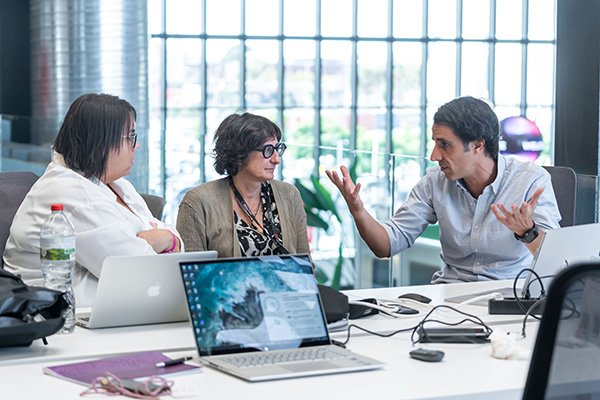Flexible, people-centred offices

17 de July de 2025
Today, office design is a true statement of intent. It says a lot about how a company understands collaboration, wellbeing, or the autonomy of its team—in other words, how much it trusts each person to organise their time, their space, and their way of tackling each day.
An office that is limited to closed offices and fixed desks conveys distrust. A flexible, open, healthy office—even in such basic aspects as air quality, ergonomics, or lighting—and one that can adapt, sends a very different message: it values talent, gives real freedom to work with one’s own judgement, and adapts to a working landscape that has already changed.
With remote workdays, teams that change size depending on the project, and teamwork between professionals in the office and others connected via videoconference, the configuration of physical space matters more than ever.
What is a flexible, people-centred office?
It is a space that adapts: with rooms that change use according to the needs of the moment, areas for focused work without interruptions, others designed for meetings without disturbing others… and corners to disconnect and recharge.
It is natural light, good ventilation, sustainable materials, and carefully considered acoustic design.
And it is also technology serving daily life: apps to book workspaces, adjust the lighting, or monitor air quality.
There are offices and office spaces already leading the way:
EDGE Amsterdam: This building is considered one of the most sustainable and intelligent in the world. It integrates IoT (Internet of Things) sensors to adapt energy consumption in real time. Each worker can personalise the lighting and temperature at their workstation via their mobile, without affecting others, thanks to an intelligent system with sensors that detect who is using the space and adjust conditions instantly.
The Dock, Dublin (Accenture): This innovation centre without fixed desks adapts its spaces according to the project or team. Accenture uses it as a global hub to co-create solutions with clients, startups, and universities, in a flexible environment that encourages collaboration.
DFactory Barcelona: An Industry 4.0 hub driven by the Consorci de la Zona Franca de Barcelona (CZFB). Spacious areas, communal zones that foster exchange, and a design focused on collaboration between companies and professionals.
Giants like Google and Microsoft are also embracing offices with indoor greenery, apps to manage space, and zones designed for movement, creativity, and relaxation.
Talent flourishes in a space designed with precision, where stress is reduced, concentration is improved, and productivity is enhanced.



